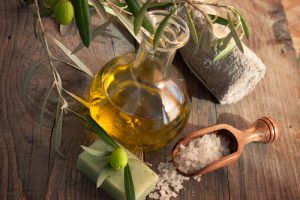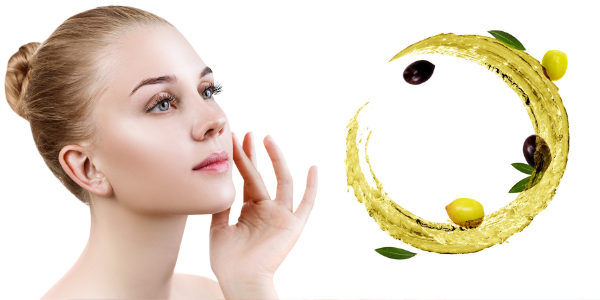To understand how olive oil affects the aging process, it’s first necessary to understand how the body ages.
The cell is the basic organism of the body. It’s made of fats and produces proteins. Cells make up body tissues like muscles and skin as well as organs such as the lungs, heart and kidneys.
How Does the Body Age?
As the body ages, cells grow larger and become unable to divide to make more cells. They are no longer able to excrete toxins, nor are they able to get enough nutrients or oxygen. The organs made from these cells slowly lose their ability to function.
Aging affects different people in different ways. Some bodies will become stiff or move slowly. Some organs will develop problems; for example, the heart can be affected by heart disease. Exposure to the sun’s UV rays, illnesses, fads in diet and exercise, as well as heredity all play a part in aging.
What Is Olive Oil?
Olives and olive trees have existed since the beginning of time. Once grown around the Middle East and Mediterranean, the trees are now grown in Mexico, California, Italy and Turkey, just to name a few. The fruit (yes, it’s a “stone” fruit along the lines of mangoes and peaches) is used both in cooking and producing oil.

The oil is extracted from the fruit by cold-pressing. Other methods include chemical extraction, which changes the dynamic of the oil. Its benefits include fighting inflammation, heart disease, obesity and much more.
What Are Its Benefits?
Antioxidants and free radicals are the body’s good and bad guys, respectively. Free radicals attack cells so they can’t function properly. Antioxidants destroy free radicals, allowing the cells can function. Olive oil is full of antioxidants.
High blood pressure and high cholesterol are the major contributors to heart attack and stroke. Extra virgin olive oil is a “good” fat whose compounds decrease high blood pressure and cholesterol, which protects the heart and helps stave off stroke.
Insulin is a hormone produced in the body. Diabetes is diagnosed when the body’s insulin is consistently unable to keep up with the glucose intake and resulting blood sugar
Phenols, found in olive oil, interact with various organs to help fight a number of diseases. The compound works with the metabolism of glucose in addition to improving the efficacy of the body’s insulin.
As the body ages, the bones become brittle. Studies show that olive oil slows the breakdown of calcium and aids the formation of bones.
It’s a well-documented fact that Europeans and Mediterranean peoples, in general, suffer less from heart disease than others, notably Americans. There’s a reason for that. Our grandmothers told us to “eat medicine,” and they were dead on. Olives and their oil contain compounds that boost the immune system into fighting off some cancer cells.
What About Aging?
We’ve seen how olive oil affects the cells in the body that make up tissue and organs. We’ve seen how the compounds specifically benefit some of the diseases to which the body is heir. What about aging?
Secoiridoids are vital compounds in extra virgin olive oil. These compounds, according to Dr. Axe, activate the genes that aid in anti-aging as well as decreasing stress on the cells. The doctor goes on to say that these compounds may suppress a gene articulation pertaining to some cancer cells as well as “age-related changes” to skin cells.
In other words, the oil bolsters the cells and is good for the organs in addition to suppressing harmful cells related to aging. Olive oil is only beneficial, though, when used in the lowest heat, because high heat destroys its beneficial compounds.





